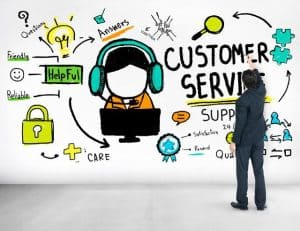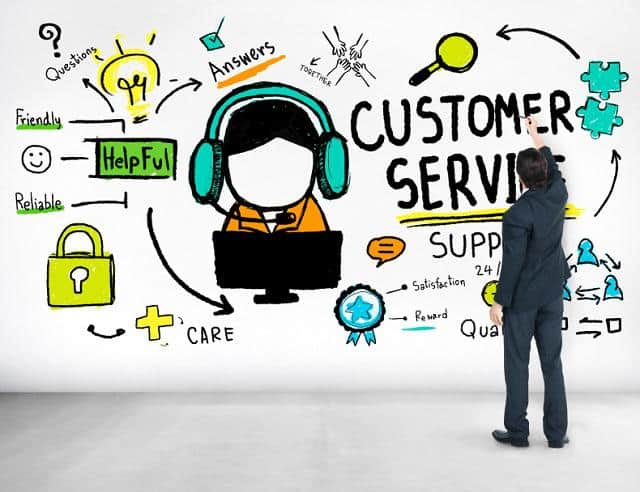Are you on a mission to improve the quality of your business customer service, but have no idea how to get started? In this article, we’ll share the top strategies for taking your customer service to the next level through a comprehensive approach. Your customers will love the improvements, and that will lead to more sales.
89% of customers are likely to make a repeat purchase after having a positive customer support experience. Therefore, getting it right can greatly impact your bottom line.
1. Invest in CRM software
CRM (Customer Relationship Management) software offers multiple advantages for improving the quality and speed of the help you can provide. Here is a summary of the few benefits to help you understand why the investment is worthwhile:
Data capture: CRM software allows you to capture large amounts of data on each customer, which can then be utilized to improve the quality of help. For instance, you can learn about a customer’s buying history to determine what products they might need in the future.
Let’s say a customer purchases a bicycle from your store. You can then suggest purchasing a bicycle repair kit or other accessories. In fact, your business can take a proactive approach by contacting customers to offer the solutions they might need.
Continue from previous interactions: customers hate having to explain themselves again when speaking with a new customer support agent. However, with CRM software agents can quickly inspect previous interactions to quickly be brought up to speed.
Automation: CRM systems can be equipped with powerful chatbots that provide instant answers to customers. This reduces the burden on your customer support agents and increases the speed with which support is provided.
2. Customer Support Agents That Are Industry Experts
It’s important to hire customer support agents that understand the industry in detail. This ensures they have the expertise to offer accurate advice that customers can use to make good buying decisions, or understand how to better use the products you’re selling.
Customers who are experts in your industry will not appreciate speaking with customer support who knows less than they do about the product you’re selling. Therefore, you need to have a system in place to train employees. Ideally, the training should go beyond answering simple FAQ questions.
You should hire individuals that are naturally enthusiastic about your industry. Also, you can segment customer support into multiple branches. Hence, customers can be put through to the individual who knows the most about a particular problem.
Finally, customer support agents should regularly learn about industry-related changes to provide up-to-date support. This could be in the form of a weekly meeting or notes that are sent out in a memo-type format.
3. Good Manners and Composure
Your customer support staff are an extension of the brand. If they act in a rude and uninterested manner, that’s what customers will think about your brand. Therefore, it’s important that with every interaction, customers act in a respectful manner that portrays your brand in the best possible light.
This includes maintaining composure when customers will inevitably get frustrated or angry. Of course, your customer support staff should not have to deal with abuse, but they shouldn’t succumb to losing control either.
In the event that there is a customer complaint about a support agent, you should review the call to see if there is a case. That’s why it’s important for calls and live chat interactions to be recorded and stored in a database. This adds accountability and will ensure that customer support agents are on their best behavior.

4. Customer Feedback
You should have a system in place for monitoring the satisfaction levels of customers after using your support team. The feedback will provide useful information for what steps are needed to reduce the number of unhappy customers.
You can create a system for creating feedback, which includes email and filling out a form in the live chat window. Also, make sure to ask politely and share why you’re collecting the information – it’s ultimately to provide a better service.
Getting business customer service right also includes researching the internet, where customers have left a review. In many instances, you’ll see comments about the quality of customer service. You should use this treasure trove of information to see what you’re doing right and wrong.
5. Multiple Communication Methods
Customers have different preferences for how they would like to contact customer support. Therefore, you should provide as many options as possible while considering the size of your budget.
Here are the top business customer service channels most customers expect:
- Live chat: nowadays, businesses without a live chat offering on their website are viewed as falling behind the curve. Therefore, you need customer service agents that provide live chat with fast response times. Also, you should have a chatbot that can answer questions instantly. AI-based technologies are improving, so this offering continues to offer more value.
- Phone: this is arguably the most expensive customer support channel, but it’s also one of the best ways to offer support. This is especially true for customers needing extra explanations for how your products work.
- Email: every business needs to have a customer support email service that offers 1-2 day response times. You can also have forms on your website that customers can fill out to start the interaction.
In the best-case scenario you should offer 24/7 customer support for every channel mentioned above. However, this can be costly, so you’ll need to figure out your budget and priorities.
Final Thoughts
The business customer service tips in this article will help overhaul client satisfaction levels, increase sales, improve brand image, and much more. Arguably the cost of improving your customer support will pay for itself since you can expect more sales.
Finally, you can get inspiration from competitor customer support teams by researching. Pay attention to the tone and depth of information provided to understand what customers expect in your niche.








